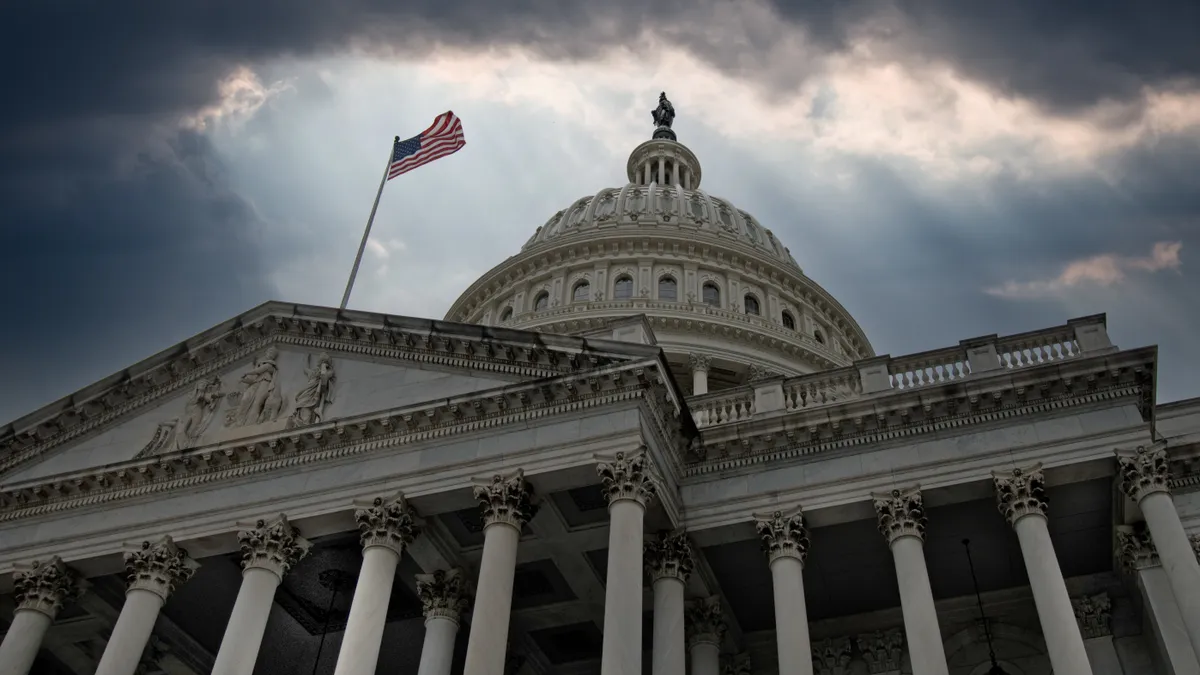Dive Brief:
- U.S. CEOs see the ballooning federal debt as the biggest geopolitical threat to business operations, exceeding risks from cyberattacks, higher energy prices and conflict in the Middle East, Europe and across the Taiwan Strait, the Conference Board said.
- “For U.S. CEOs, the biggest risk is right at home — the mushrooming U.S. national debt and deficit,” the Conference Board said, reporting on a survey of 630 CEOs and 617 other C-suite executives. The federal debt has surpassed $34 trillion, equivalent to $269,000 per household and roughly equal to the combined value of the economies of China, Germany, Japan, India and the U.K., according to the Peter G. Peterson Foundation.
- “High national debt threatens business growth by crowding out private investment and diverting investment away from the private sector,” the Conference Board said. “The increasing practice of issuing U.S. Treasury securities to finance deficit and debt places tremendous strain on the financial system, potentially raising business borrowing costs and limiting access to capital.”
Dive Insight:
The federal debt has soared because of a combination of tax cuts, rising interest payments, a revenue slump during a 2020 downturn, deficit spending including pandemic outlays, and long-term legislative gridlock.
Congressional leaders currently are struggling to pass a stopgap funding bill that would avert a shutdown and finance the government into March.
Even as lawmakers fail to agree on spending, many of them acknowledge that current fiscal policy is unsustainable.
Inflation and rising interest rates during fiscal year 2023 pushed up the cost of paying off the debt by $162 billion, or roughly the size of the U.S. defense budget, the Conference Board said.
The U.S. currently spends more than $1.8 billion per day on interest payments, and during the next decade interest costs will total $10.6 trillion, the Peterson Foundation said.
When fiscal challenges persist, “access to capital is reduced, interest costs crowd out key investment in our future, the conditions for growth deteriorate and our nation is put at a greater risk of economic crisis,” according to the Peterson Foundation.
U.S. CEOs identified recession and inflation as the top two external factors that will most influence their businesses in 2024, the Conference Board said.
Even though price pressures surged more than a year ago to the highest level in four decades, only 34% of CEOs said their companies are prepared to handle inflation.
More than half of the chief executives (55%) cited “economic downturn/recession as a high-impact issue for the coming year,” according to the Conference Board.
“While the prospects of a soft landing have risen, most CEOs in the U.S. are still bracing for a recession in 2024,” the Conference Board said.
Only 37% of the CEO survey respondents said their companies are ready to deal with recession, the Conference Board said while affirming its forecast that the “economy will slip into a short and shallow recession in early 2024.”
Federal Reserve policymakers, including Chair Jerome Powell, have expressed confidence that the U.S. economy will avoid recession even though the central bank has pushed up the federal funds rate to a 22-year high.
“The data we have received the last few months is allowing the [Federal Open Market] Committee to consider cutting the policy rate in 2024,” Fed Governor Christopher Waller said Tuesday, noting that the labor market has loosened, inflation has slowed and economic growth has cooled.
“I am feeling more confident that the economy can continue along its current trajectory,” Waller said during a webcast hosted by the Brookings Institution. “However, concerns about the sustainability of these data trends requires changes in the path of policy to be carefully calibrated and not rushed.”















